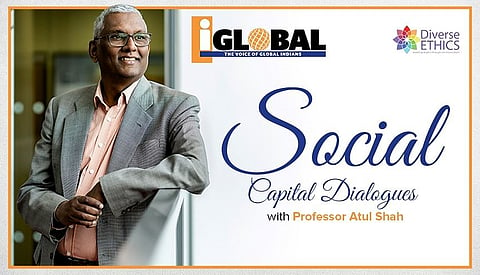

Migration involves risk. It also opens opportunity. Sadly, the history of European empires has been one of violence and expropriation, with India looted and pilloried for over four hundred years by various European countries, with Britain later taking the helm. One of the legacies of empire has been a reverse migration, and I am delighted and not surprised to see the latest research findings of the independent and authoritative think tank Policy Exchange. Of all the minorities in Britain, the Indians come out on top in terms of education and employment.
For those of us from this culture, this should not come as any surprise at all. In our homes, we push our kids to work hard, and help them become resourceful and responsible citizens, through the transmission of our culture and values. We live by this example and cherish our faith and belief in an inclusive planet, not just for human beings but for all life.
In return for our Imperial impoverishment, we have given Britain energy and enterprise. How is that for a fair exchange? Rarely do we commit crimes – our prison population is close to zero. The wide impact of minorities in Britain, and the huge strength it gives to our country, ought to be celebrated – instead we often get racism, and riots like those last summer. Yes, we recently had an Indian Prime Minister, but that does not overnight change the stakes or the respect we deserve. Britain is very good at ticking boxes and holding on to white power.
MORE LIKE THIS…
If we examine leadership and influential roles, whether in government or the private sector, we rarely get the jobs and opportunities we deserve, unless we set up our own enterprise. In the national media, our culture is rarely celebrated – just look at the culture pages of ‘The Sunday Times’ to see if you can find any mention of Diwali or Navratri. The BBC coverage on our Indian diaspora is shambolic. We have built a large number of community institutions, charities and temples which help us reinvigorate our public and civic values, yet in the national media, these stories rarely if ever come out. We are Britain’s largest investors of peace and social cohesion, but who is counting or valuing our economic contribution?
In our universities, we hardly have any Indian Vice-Chancellors despite our educational record. The same applies to Chief Executives and Board Chairmen in the National Health Service, where we are some of the most talented and respected Doctors and Consultants. Research on the glass ceilings in these organisations, and regular racial monitoring, is crucial to transform behaviours and prejudices. The Institute of Chartered Accountants in England and Wales has never had a non-white President, even though Indians comprise probably 20 per cent of its membership and are some of its best professionals. They do not even collect membership data about the ethnicity of their members or release it publicly to make them accountable and observe their legal duty as a public body to protect equality. Good accountants are critical to business success and can provide a range of support and advice especially for startup businesses who cannot afford full-time experts. Our Indian economic success in Britain has often been because of such people.
MORE LIKE THIS…
In his foreword, Sir Trevor Phillips laments the lack of proactivity in harnessing our diversity from government. We actively need to build and nurture institutions and strategies which help us shape an inclusive and vibrant society, with an equally large global impact. This has social, economic and creative benefits, and helps us embed and celebrate our unique national strength. Perhaps civil servants do not want this.
My research shows that in our knowledge and theories, the possibility of other cultures to have interesting solutions to British social problems is non-existent. The curriculum is still highly colonised. Hopefully, our talented students will transform the social sciences too in the years to come.
MORE LIKE THIS…
Professor Atul K. Shah [@atulkshah] teaches and writes about Indian wisdom on business, culture and community at various UK universities and is a renowned international author, speaker and broadcaster.